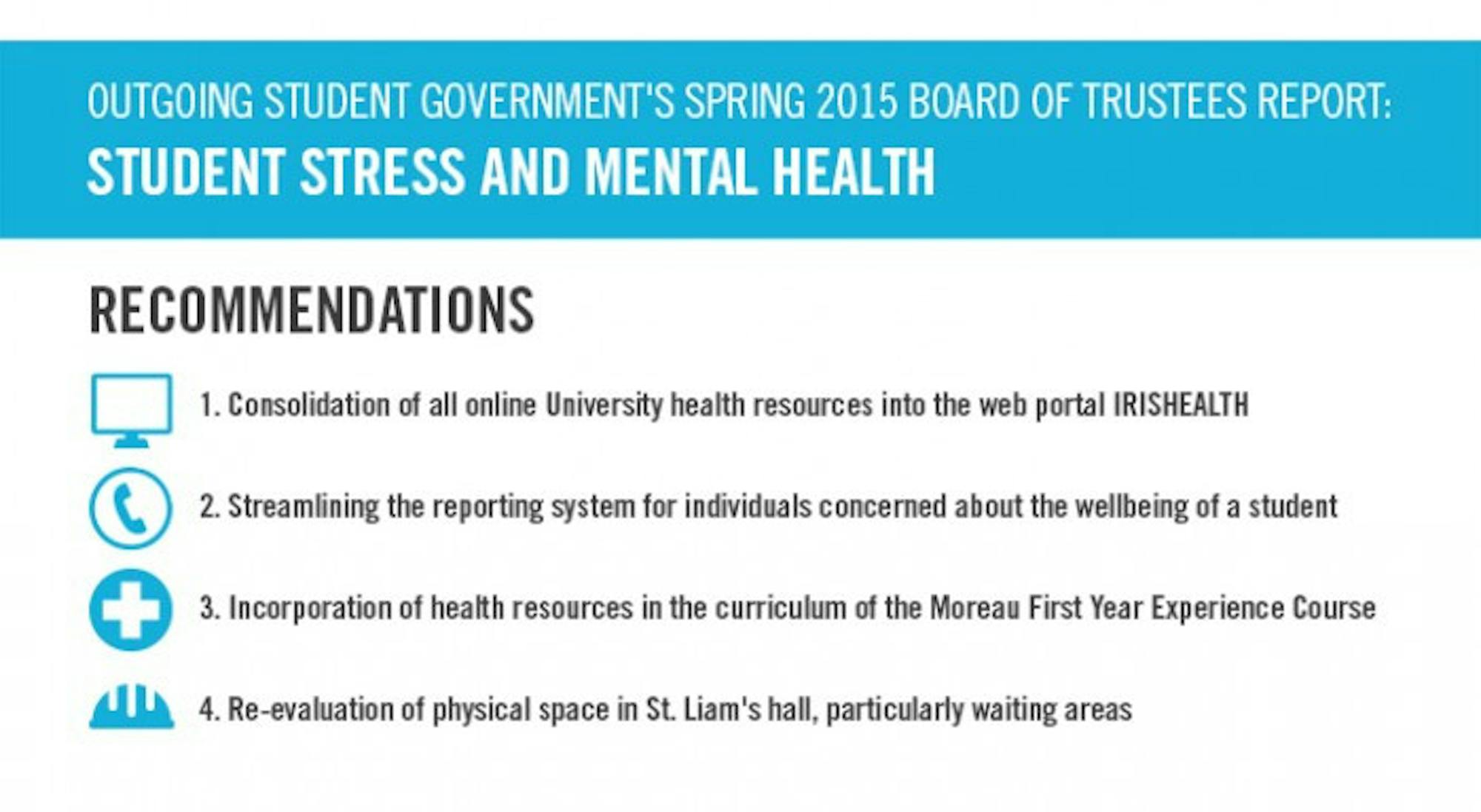
On Thursday, student body president emeritus Lauren Vidal, student body vice president emeritus Matthew Devine and student body chief of staff emeritus Shannon Montague will present recommendations to the Board of Trustees for how the University can improve mental health resources for students.
Each spring, the outgoing student body administration has the opportunity to present recommendations on an issue they are passionate about to the Board, Vidal said.
Vidal said her administration has been working on the mental health issue for quite some time; she, Devine and Montague gave a “preliminary report” to the Board of Trustees on stress and student wellbeing in October.
Vidal said the former administration began the report by assessing the resources on campus and how students use them.
“We found that we have all if not more resources than what universities across the nation have, so in that respect we are doing a good job," she said. "I think what we need to do differently is the promotion of our resources and how to bring students in by reducing the stigma.
“So we approached that for a year. We thought, how can we really change this on campus?”
In the final report this Thursday, the group will recommend the following:
- “Strategic consolidation of all University health resources for easier access, recognition and usage through the centralized web portal: IRISHEALTH"
- “Streamlining of the reporting system for individuals (faculty, staff, peers of fellow students) who are concerned about the wellbeing of a student"
- “Incorporation of a consolidated web portal of health resources in the curriculum of the Moreau First Year Experience course"
- “Reevaluation of the physical space in St. Liam’s Hall to redefine the hall as a ‘house of health.”
The purpose of the IRISHHEALTH portal, Vidal said, would be to combine the existing information and resources that are currently available on the University Counseling Center (UCC) website, the University Health Services (UHS) website and the McDonald Center for Student Well-Being website as well as making it easier to navigate for students.
“We’re going for rebranding and consolidation,” Vidal said.
The second recommendation revolves around the Campus Assessment, Response and Education (CARE) program that, among other things, is a resource for people on campus concerned about a student’s wellbeing and also to assist students applying for readmission to the University. Vidal said many on campus were unsure of how these resources worked.
The Moreau First Year Experience course will replace the current Physical Education and Contemporary Topics curriculum. The group has proposed that part of this curriculum detail the resources available for mental health and wellness and how to find and use them.
Finally, the group has recommended that the space in St. Liam’s be reevaluated, particularly regarding waiting rooms. Vidal said the group suggested that the waiting rooms for the UCC and UHS be consolidated into one, in order to help students feel more comfortable. Vidal said she had received the most positive feedback on this point out of all the recommendations.
The report also detailed a number of findings. One of the notable points concerned populations on campus especially vulnerable to “excessive stress levels and the associated mental health consequences,” the report reads.
“We identified two; the first is first-year students … The second is international Asian students; we have found a lot of research to support that,” Vidal said.
According to the data presented in the report, only 3.7 percent of students enrolled in the First Year of Studies visited the UCC in the 2013-2014 academic year, compared with 22 percent of Arts and Letters students, 9.9 percent of Architecture students, 11.5 percent of Business students, 16 percent of Engineering students and 18 percent of Science students.
Additionally, they found based on UCC data and national averages that the University has higher percentages of students with psychotropic medication, alcohol abuse, ADHD and eating disorders compared to other mid-size universities.
Official findings of the report include the following:
- “Misconceptions about postgraduate opportunities lead to unrealistic views on ‘necessary’ academic and extracurricular involvement, which contribute significantly to student stress."
- “Students primarily connect with resources online and look to the Internet first when searching for information."
- “The University does offer a number of counseling and support resources, but there is a lack of awareness of these resources among students."
- “The stigma surrounding mental health may prevent students from getting the help they need."
- “There are reporting structures in place, but faculty members still remain generally unaware of how to recognize students who may be struggling emotional and how to get them the help they need.”













